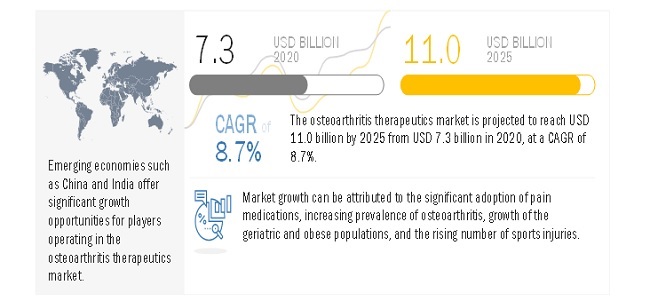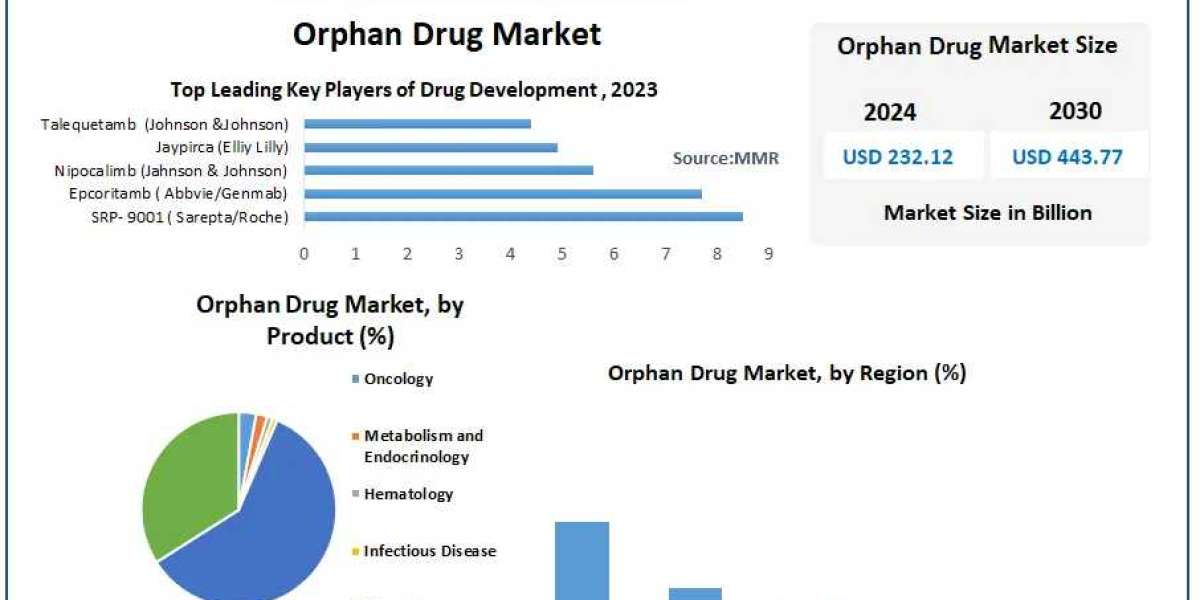
The global osteoarthritis therapeutics market has witnessed remarkable growth and is projected to continue its upward trajectory, reaching an estimated value of $11.0 million by 2025. This market, valued at $7.3 billion in 2020, is expected to grow at a compound annual growth rate (CAGR) of 8.7% from 2020 to 2025, according to a report by MarketsandMarkets.
Download PDF Brochure-https://www.marketsandmarkets.com/pdfdownloadNew.asp?id=209565994
Driving Factors
Several key factors are driving the growth of the osteoarthritis therapeutics market:
Rising Geriatric Population: With an aging global population, there is an increased prevalence of osteoarthritis among the elderly. This demographic trend is a significant driver for the market as osteoarthritis is more common among older individuals.
Improved Healthcare Infrastructure: The healthcare infrastructure in several Asia-Pacific (APAC) countries has been undergoing significant improvements. This enhancement in healthcare facilities and services is creating growth opportunities for the osteoarthritis therapeutics market in the region.
Adoption of Pain Medications: Pain management is a crucial aspect of osteoarthritis treatment, and pain medications, including topical, oral, and parenteral options, are widely used. The ease of administration and affordability of these medications contribute to their high adoption rate.
Viscosupplementation Agents: Among the different drug types in the market, viscosupplementation agents have emerged as a significant segment. The rising incidence of knee osteoarthritis is a key factor driving the growth of this segment.
Hospital Pharmacies: Hospital pharmacies are the primary distribution channel for osteoarthritis therapeutics. The high volume of patients seeking treatment for osteoarthritis in hospitals and the availability of a wide range of therapeutics contribute to the dominance of this distribution channel.
Challenges
Despite the promising growth prospects, the osteoarthritis therapeutics market faces challenges, particularly related to the use of Nonsteroidal Anti-inflammatory Drugs (NSAIDs):
- Cardiovascular Risk: The use of NSAIDs in osteoarthritis treatment is associated with an increased risk of adverse cardiovascular events. This risk has led to concerns among healthcare professionals and patients, potentially discouraging the use of NSAIDs for pain management.
Opportunities
The market also presents several opportunities, including:
- Personalized Medicine: Advances in diagnosing, treating, and monitoring osteoarthritis have led to the conceptualization of personalized medications. Biomarkers and clinical characteristics can be used to identify patients who are likely to respond to specific therapies, improving treatment efficacy.
Market Segmentation
The osteoarthritis therapeutics market is segmented based on various factors:
- Anatomy: Knee osteoarthritis holds the largest share of the market.
- Drug Type: Viscosupplementation agents, NSAIDs, analgesics, and corticosteroids are the key drug types.
- Route of Administration: Parenteral administration is the most widely adopted route.
- Distribution Channel: Hospital pharmacies dominate the market.
- Purchasing Pattern: Prescription drugs are the preferred choice.
- Region: Europe led the market in 2020, with rising incidence rates and an aging population being major contributing factors.
Key Players
Prominent companies in the osteoarthritis therapeutics market include Sanofi, Horizon Therapeutics PLC, Johnson Johnson, GlaxoSmithKline PLC, Bayer AG, Abbott, Pfizer, Inc., Eli Lilly, Anika Therapeutics, Inc., Novartis AG, Ferring Pharmaceuticals, Bioventus, Zimmer Biomet Holdings, and more.
Download PDF Brochure-https://www.marketsandmarkets.com/pdfdownloadNew.asp?id=209565994
In conclusion, the osteoarthritis therapeutics market is poised for significant growth, driven by factors like an aging population, improved healthcare infrastructure, and the adoption of pain medications. However, the challenge of NSAID-related cardiovascular risks needs to be addressed, and the emergence of personalized medicine offers exciting opportunities for the future of osteoarthritis treatment.



